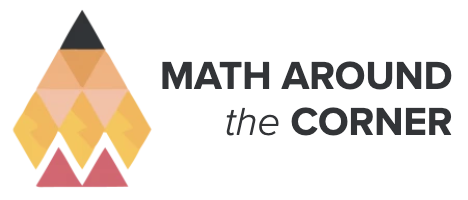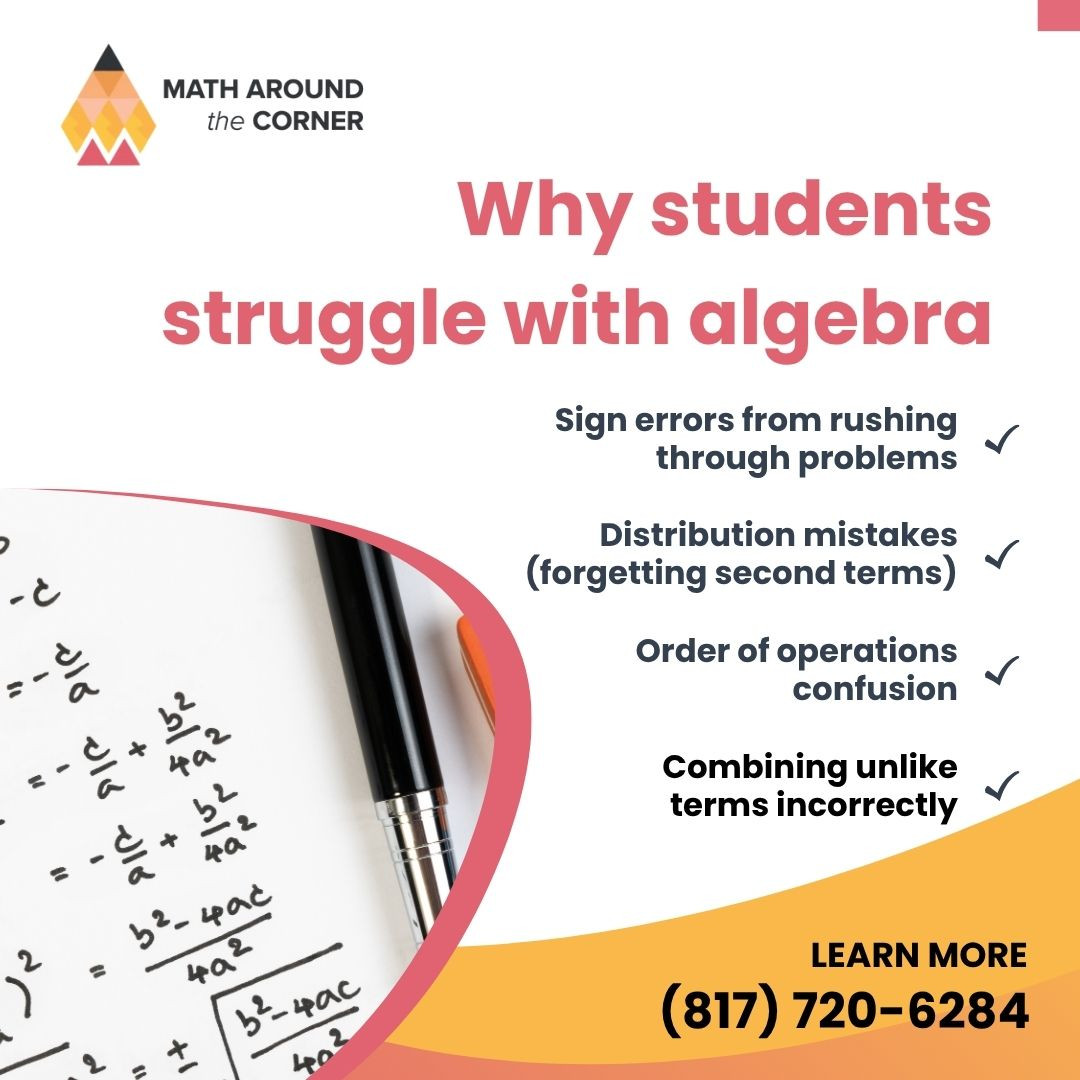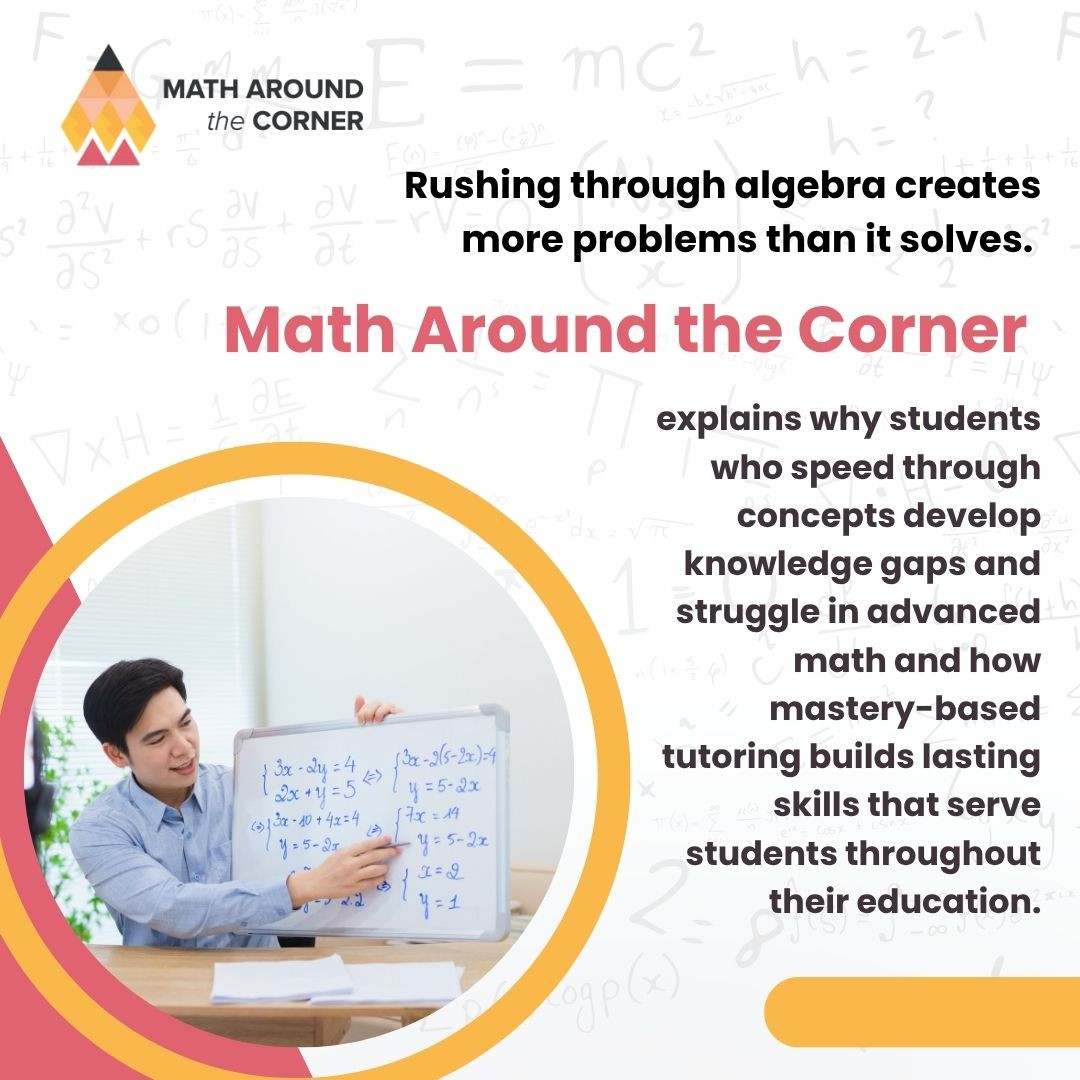The Algebra Learning Curve: Why Students Rush Through Algebra and How It Hurts Their Progress
Fort Worth, United States - November 25, 2025 / Math Around The Corner /
FORT WORTH, TX - Rushing through algebra tutoring creates more problems than it solves. Students who try to speed through concepts often develop knowledge gaps, make repeated mistakes, and struggle with advanced math later. Math Around the Corner focuses on quality algebra tutoring that builds understanding step by step, not racing to finish material.
Why Students Rush Through Algebra
The pressure to keep up drives many students to rush. School curricula move fast, leaving little time for deep understanding. Students see classmates advancing and worry about falling behind. Parents want quick results. However, this rush creates a cycle where students memorize procedures without grasping why they work.
UNESCO data shows that worldwide, only 44% of students achieve minimum proficiency in mathematics by the end of primary school. This learning crisis often starts when students move too fast through foundational concepts without mastering them.
Common Math Mistakes From Rushing
Understanding common math mistakes helps students avoid them. These errors appear repeatedly in algebra tutoring sessions.
Sign errors happen when students drop negative signs or place them incorrectly. A simple -3x becomes 3x, making every following step wrong. These mistakes occur most often when students rush through problems without checking their work.
Distribution mistakes are another frequent problem. Multiplying 3(x + 2) should give 3x + 6, but many students write 3x + 2 instead. They distribute to the first term but forget the second.
Order of operations confusion leads students astray. They might add before multiplying, or handle exponents incorrectly. PEMDAS exists for a reason, but rushed students skip this order and get wrong answers consistently.
Combining unlike terms reflects an incomplete understanding of concepts. Students try to add x + 5 and get something impossible. Variables represent unknown values, and you cannot combine them with numbers unless they match perfectly.
How Rushing Backfires
Knowledge gaps accumulate when each topic is rushed. Over time, these gaps add up. Students find themselves unable to solve problems that require earlier concepts. When tests come, they struggle because they memorized steps without understanding principles.
Research from industry experts shows that students who receive quality instruction with proper time allocation demonstrate statistically significant improvements in understanding. The study found positive effects on both teaching practices and student learning outcomes when educators used inquiry-oriented lessons instead of rushing through the curriculum.
Confidence drops as students make more mistakes. Lower grades destroy confidence. Soon, students believe they are just bad at math. This belief becomes self-fulfilling, and they stop trying because success feels impossible.
Advanced math becomes impossible for students who rushed through the foundations. Algebra 2, pre-calculus, and calculus all require solid Algebra 1 skills. Students who rush hit walls in advanced courses because they cannot factor polynomials quickly or work with rational expressions.
Tutoring Algebra: What Proper Learning Looks Like
Effective tutoring of algebra explains the why behind every procedure. Why do we move terms across the equals sign? Because we maintain balance. Understanding these reasons helps students apply concepts to new situations.
Practicing until mastery builds skill. Not mindless repetition, but thoughtful practice with increasing difficulty. Students work problems, get feedback, correct mistakes, and try again. This cycle continues until they solve similar problems accurately and quickly.
Learning from mistakes turns errors into lessons. What went wrong? Where did the error occur? How can we prevent it next time? These questions turn mistakes into valuable learning opportunities instead of mere failures.
How Long Does Learning Take
Most students need a full school year for Algebra 1 when learning properly. Trying to condense this timeline usually backfires. One-on-one algebra tutoring accelerates learning compared to large classrooms because individual attention addresses specific struggles immediately.
The key to learning algebra fast is actually slowing down enough to understand each concept thoroughly. When students grasp core ideas deeply, they solve problems faster and make fewer mistakes. They do not need to constantly relearn material. True speed comes from solid understanding, not from racing through topics.
Moving Forward
Mastering algebra takes time, patience, and proper guidance. Students who rush through material set themselves up for frustration. Those who invest in understanding build skills that serve them throughout their education. The difference shows not just in grades, but in confidence and readiness for future math courses.
For details on Math Around the Corner's tutoring services, call (817) 720-6284 or email hello@matharoundthecorner.com.
About Math Around the Corner
Founded in 2006, Math Around the Corner is a privately owned tutoring center in Fort Worth offering personalized, one-on-one academic support for students from Kindergarten through college. Serving over 400 students in the Fort Worth area, the center provides K–12 tutoring, SAT and ACT preparation, and college readiness programs. Math Around the Corner is located at 6134 Southwest Blvd, Fort Worth, Texas.

Contact Information:
Math Around The Corner
6134 Southwest Blvd
Fort Worth, TX 76109
United States
Carol Bearden
https://matharoundthecorner.com/
Original Source: https://matharoundthecorner.com/resources/the-algebra-learning-curve-why-rushing-through-tutoring-algebra-backfires


